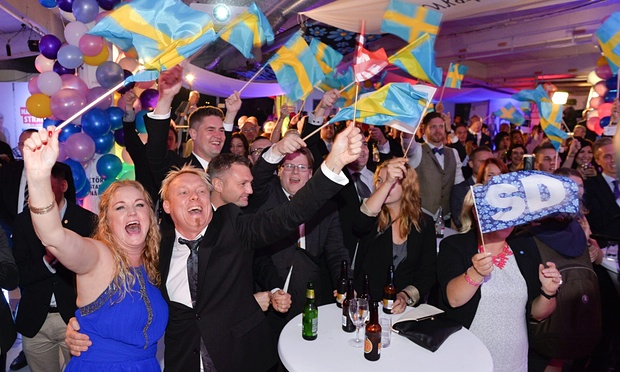Laughing, police accused him of punching a bouncer, although there were many witnesses who said that he did not. “It was one of the most demeaning experiences of my life,” says James. “I always had the perception that people were forward-thinking and liberal in Scandinavia, but not even an animal should be treated in that way.”
He tried to seek justice through the courts but after police dropped the case against him Swedish lawyers advised him not to press charges.
Kyle James, who was pepper-sprayed by bouncers at a Swedish nightclub.
James’s experience may be more than an unfortunate but isolated incident, according to a recent report by the United Nations, which concludes that a rising level of racist violence and “Afrophobic” hate crimes in Sweden are “an extensive social problem”.
“There continues to be a general Swedish self-perception of being a tolerant and humane society, which makes it difficult to accept that there could be structural and institutional racism faced by people of African descent,” says the report, which was presented to the UN human rights council on Monday.
The country’s official philosophy of equality and respect for human rights “blinds” it to the racism faced by African-Swedes, it says. Hate crimes against the 200,000 or so black people of African origin in Sweden increased by more than 40% between 2008 and 2014, according to the National Crime Prevention Council, or BRÅ, with more than a fifth of incidents last year involving violence.
But broader attitudes to black people have also come under scrutiny after high-profile incidents, such as the occasion in 2012, when the then culture minister laughingly cut into the genital area of a cake depicting a stereotypical black woman connected to an artist’s grotesquely blacked-up face.
Last month the mayor of Lidköping in central Sweden, a member of the ruling Social Democrat party, publicly defended the traditional name of “negroballs” to describe a popular chocolate cake.
Sweden’s official liberalism seems a paradox alongside high levels of discrimination, according to Tobias Hübinette, associate professor in intercultural studies at Karlstad University. “The welfare state takes care of you if you are inside the system, but access to the system is largely through work and partly through the residential market, which are highly segregated.”
Surveys suggest Swedish people’s attitudes are laudable, says Kitimbwa Sabuni of the National Association for African-Swedes. “But the problem is anti-racist values and practices are not the same thing. When it comes to anti-racist practices Sweden is so far behind.”
While Sweden has done much to address its past connections to the Third Reich and race biology, it has not begun to debate its involvement in the slave trade and the dehumanising ideology that made that possible, says Christer Mattsson, acting director of the Segerstedt Institute, Sweden’s new anti-extremism unit at Gothenburg University.
“When you are unaware that this was a part of your past you do not present any strategies for redeeming yourself,” Mattson said.
However, Adam Cwejman, author of Well-meaning Racism: How Anti-racism Makes People Victims, questions the impact of racism and stereotyping on ethnic groups’ varying levels of achievement.
“We have a strong public consensus that we are trying to root out derogatory attitudes,” he says. “It would be better if we admitted that Sweden is one of the most tolerant nations in the world.”
• This article was amended on 2 October 2015. An earlier version made a reference to “niggerballs”, which has been deleted. Both that term and “negroballs” are used and both are equally offensive. However, the latter is a more literal translation of the Swedish word.
More about:















































